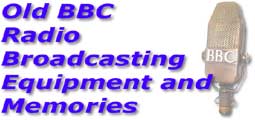A few years later my parents were astonished when I was offered a post by BBC Birmingham at just 16 with barely more than an elementary school education. The letter came from the EiC, Mr. Baseby, starting me at a weekly wage of one pound, seven shillings and sixpence. I was one of three YITs (youths in training) with Barry Gittings and Tony Steedman who went on to act at the Birmingham Rep. It was the beginning of the happiest, most exciting professional period of my life.
On a recent visit to London, I took a trip down memory lane: first to 200 Oxford Street (OST) where a small plaque in the basement womens' lingerie marks the site of many of the overseas studios, and the widely popular BBC canteen, I was also anxious to tour Broadcasting House, which had never been open to the public, but renovation work was massively in progress.
Visiting Bush House I met up with a couple of old friends, an OBA/8 and MX/18 - in the museum of all places! I was certainly feeling my age - I could still operate those things! I remember the intense excitement in the control room there on the morning of the D-Day operations as the BBC made the long-awaited announcement to the French underground movements. For months the fourth channel of all the MX/18s in the continuity suites was marked M of I (Ministry of Information) – not to be opened under any circumstances. It was the source of the official D-Day announcements. And remember the menacing-sounding dot, dot, dot, dash – the V signal used between programs to identify the BBC to the European underground movements?
Tight security precautions were taken on all wartime newscasts in foreign languages beamed to occupied countries. The announcer was always accompanied by a 'censor', a staff person who knew the language and sat facing the announcer with his finger on a key mounted in a black box (slightly larger than a Rubik's cube) throughout the broadcast. If the announcer strayed from the script, or tried to send a coded message, the censor would immediately press the key, cutting him off the air. Whether it was ever used I don't know.
Then there was the morning the team of Mrs. Mopps didn't show – they died when their flats were destroyed by a buzz-bomb (V1). And the afternoon the double-decker bus and its passengers splattered all over the ornate entrance to Bush House during rush hour.
Back in 1943, my first job at 282 Broad Street, BM, was topping up the acrid-smelling HT batteries under the watchful eye of Mr. Beck, later graduating to the SB desk. The equipment was ancient, going back to 1927, as were some of the control room engineers! They were an odd bunch who did not take kindly to us kids, and they had no time for the artistic side of broadcasting. Talking of which, I recall our two golden-voiced announcers, Bunny Hodgeson and Joan Edgar, and the Midland Light Orchestra in Studio 4. And I fell in love with a strikingly handsome young PE named John Borwick, who later became the long time technical editor of Gramophone (I don't think he was ever aware of my infatuation.)
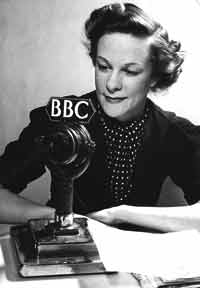
Jean Griffith, one of the General Forces Programme announcers,
introducing 'Forces Favourites' a record request program originating
from 200 Oxford Street in 1944.
On one occasion I had to play a huge transcription disc recording of Alistair Cooke's 15 minute Letter from America. Back home, I discovered that the famous man was in fact my father's cousin. Since we frequently had to broadcast recorded classical music, there was intense competition among JPEs (Junior Programme Engineers) over the fine art of seamlessly linking 78s – quite a complicated trick.
Then there was the incident which nearly got me fired! Each weekday at 07:55, following Lift Up Your Skirts (sorry, Hearts) the announcer would give details of the day's radio programs (Programme Parade), but instead of having to head to the studios for a five minute live broadcast at such an early hour, the announcer, unbeknownst to the public, would record them a week in advance and leave it to the TA to play the appropriate day's recording. One Tuesday morning I played Wednesday's recording by mistake. That evening the newspaper headlines screamed "BBC puts the clock on 24 hours ... secretaries scramble for their calendars ... seems a junior technician goofed!" My parents were mortified.
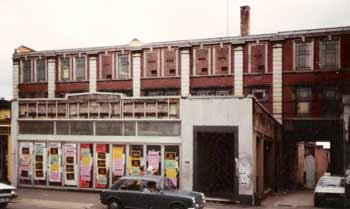
And so it was on to the BBC training school, first at Maida Vale, where I would eventually be working as a music PE in the vast MV1 studio, then Wood Norton, a magnificent stately mansion in Evesham, the secret emergency HQ for broadcast operations, should London Control Room be destroyed. It was an idyllic period, interrupted only by an outbreak of German Measles which quarantined us trainees briefly.
Back to BM, where I had the incidental honour of re-opening the BBC's Midland Region. It was Tony Shryane, who created The Archers - as a working-class antidote to the stuffy Mrs. Dale's Diary - who sparked my interest in programme engineering. Happy days in BM included working with SPE Kenneth Pakeman, and producer William (Bill) Hughes on his series of radio dramas in the DC Room – dramatic control incorporating multiple studios was a new innovation.
During my two-year stint in the RAF, I joined the Forces Broadcasting Service. (The BBC very thoughtfully passed on the word to the War Office whenever one of its employees was called up.) Word came through while I was stationed in Basrah (Iraq) and I was shipped off to Cairo, where I served as a news announcer in the studios of ESB (Egyptian State Broadcasting).
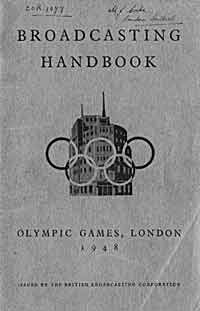
The War Office then moved us to Jerusalem in 1948 at the time of the Israeli uprising. Incidentally, two of my fellow announcers there were Stf/Sgt Ian Richardson and Sgt. Richard (Dicky) Pasco. Ian at 19 was already well-known for his magnificent voice. We remained close friends until he died all too early in 2008. Richard of course subsequently became a remarkable actor.
On being re-instated in London in 1948, I was temporarily added to the Olympic Games OB coverage at Wembly. I still have the broadcasting handbook issued to BBC staff (right). I then joined the BBC's Music Department as a PE (SM) at Maida Vale. I recall the acme of a well-balanced symphony broadcast in those pre-stereo days was a single mic positioned high above the conductor, plus one for the soloist. Multi-mic balances were strictly a no-no! It was a very competitive field (art?) among PEs (SMs).
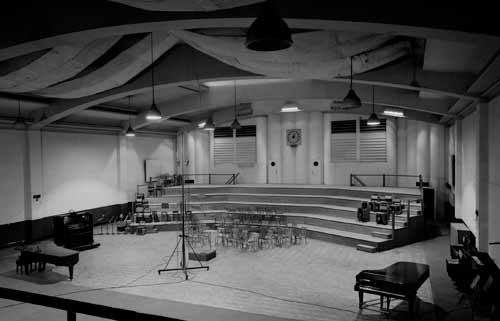
Maida Vale Studio 1 seen in 1947
